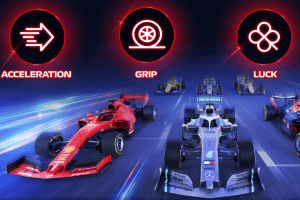NFT Devs Build While Users Follow Ethereum Price & Wait For Better Products
The videogame industry saw growth in download and usage numbers during the lockdowns. “The NFT gaming world isn’t very large, and the users are very valuable.”

The coronavirus-related lockdown might help the non-fungible token (NFT) market, but industry players should offer better products if they want this sector to go mainstream.
While the NFT market is slow lately and people are currently selective with their purchases, the NFT gaming will pick up and become mainstream eventually, believe five experts Cryptonews.com talked to.
“I think the NFT gaming scene will go mainstream one day,” says Andrei Edell, founder of a collectible indie card game on Ethereum (ETH), Flowerpatch, with transparent gaming companies and marketplaces like OpenSea leading the way. This will happen once the usability issues are solved as “it needs to be super easy.” Gamers will realize that their digital property has real value and that they should truly own it.
Yat Siu, Co-Founder and Chairman of Animoca Brands, Hong Kong-headquartered publisher of mobile games, also stated that “although blockchain and NFTs are still in the early stage of adoption, we believe they are the future of gaming and digital collectibles,” especially as ITrue digital ownership allows gamers to actually own their in-game assets and thus be able to benefit from them. “When widely adopted, this will be a major revolution for the industry, which traditionally has operated by restricting digital assets via licensing rather than allowing players to own those assets.”
Bobby Ong, Co-founder of major crypto market data provider CoinGecko, thinks that the NFT market has been a bit slow lately “but it will come a time when it gets in vogue again.” A year ago, the company was looking to get into the NFT space, but now this strategy is on hold, as the CoinGecko is now focusing on DeFi (decentralized finance) more. “Maybe we may revisit NFT later again as we grow our team,” Ong says.
Meanwhile, there are projects building in the background, while the Cryptokitties, Axie Infinity, Decentraland (MANA), and Gods Unchained are actively building their projects and acquiring users.
A side effect of the lockdown
On the gaming and entertainment side, metrics are rising across the industry, says Roham Gharegozlou, CEO of Dapper Labs, a blockchain company and creator of CryptoKitties, adding: “digital entertainment is in greater demand than ever.” Edell from Flowerpatch agrees, saying that it seems that the entertainment/gaming industries have benefited from people staying home due to the coronavirus pandemic. However, he believes that people are being selective with their purchases now. When the value of ETH drops, less money is in the hands of the current userbase, which impacts the prices of the assets, says Aleksander Larsen, COO Axie Infinity, a game (dapp) that runs on the Ethereum blockchain. He adds that people are less likely to spend money on NFTs since they believe in the potential upside of ETH/other assets.
Siu and Larsen also both note that the videogame industry saw growth in download and usage numbers during the lockdowns. Siu finds that NFT-based gaming will probably be bolstered to some degree after the lockdown, given this renewed interest in gaming, while Larsen doesn’t think that blockchain companies can capitalize on this growth wave for now. “The products are simply not good enough,” he says, which he hopes Axie Infinity will change with their new card game available for testing before its global release.
In this situation, argues Edell, “we need to stand out in the crowd.” To this end, Flowerpatch decided to become “radically transparent,” but also to focus on partnerships with other Ethereum games and continuing to drop NFTs as presents, hoping to deal with the marketing challenge. “The NFT gaming world isn’t very large, and the users are very valuable,” he says, announcing new NFT drop-related promotions.
Demand for collectibles
Larsen adds that Axie Infinity is “frequently in touch with investors and can tell that the market has dried up considerably after the recent situation with COVID-19.” Still, while NFTs are usually correlated to the crypto market, some truly collectible Axies have gone up in value.
Siu from Animoca Brands shared that, in terms of the performance of their NFT-based games, the company saw evidence of positive impact in March. The Sandbox, their decentralized social multiplayer gaming platform, conducted its third presale event, selling out 12,384 unique LAND NFTs within 5 hours and generating more than ETH 3,400 (c. USD 657,000). Meanwhile, their blockchain game F1® Delta Time completed its first crate sale, selling 2,375 crates, including over 94% of available top tier crates, and generated over USD 364,000, making it the top blockchain game as ranked by 24-hour, 7-day, and 30-day trade volume on both DappRadar and Dapp.com, says Siu.
As many other companies within the crypto and blockchain industries, the NFT players have adapted easily to the pandemic-caused changes, with all of them working from home. None have experienced major issues. Gharegozlou shared that Dapper Labs has supportive partners and investors, the products haven’t seen a decline in usage, and as they were technology-wise prepared for people to work from home for productivity, they’ve “luckily not missed a beat.”
Animoca Brands also experienced moderate day-to-day operations slow-down, primarily caused by increased safety precautions. However, Siu notes that most face-to-face meetings and business events (such as conferences and exhibitions) have been delayed or canceled. CoinGecko’s Ong finds that this is likely the largest problem for the industry now, as crypto conferences “are one of the most important elements of this decentralized industry. It’s where all industry players meet to discuss business opportunities.” Larsen agrees. “The recent events have had an impact on our company since we are unable to travel to events and meet our business partners,” he says.




